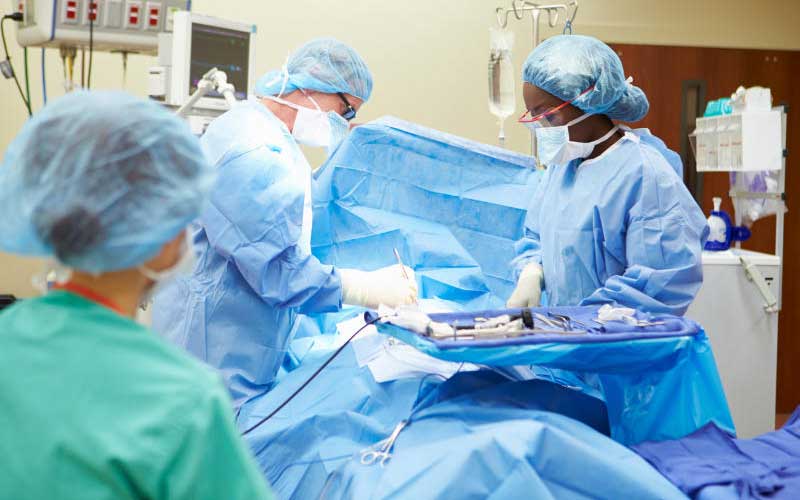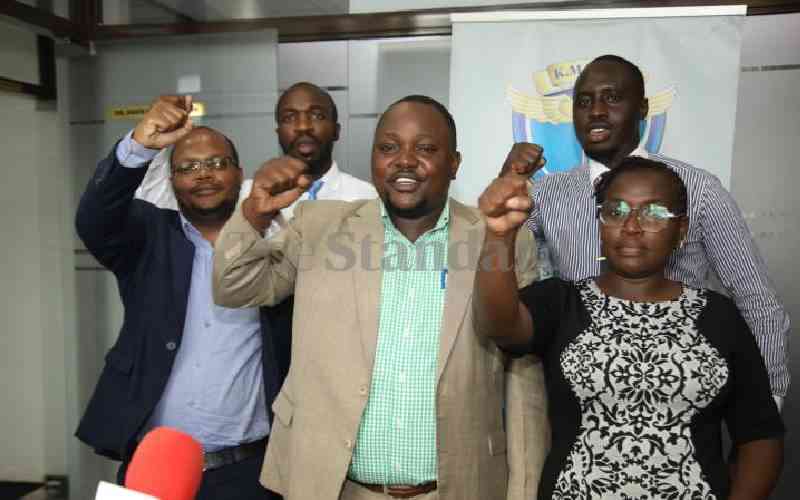
The medical profession is going through challenges as health practitioners seek better remuneration and working conditions through industrial action.
It has however emerged that the country is grappling with bigger issues relating to training of doctors and dispensation of medical care that require urgent attention of the national and county governments.
Dr Joseph Amolo Aluoch, physician and chest consultant, who has practised for 52 years and the Dean, School of Medicine University of Nairobi Prof Fredrick Otieno have passed a harsh verdict on medical training in Kenya.
Dr Aluoch says quality of teaching and research work in medical schools has diminished to low standards because students hardly even get 10 per cent attention from their lecturers.
He also blames the parallel degree programmes and corruption for watering down the medical profession.
“The students are virtually on their own for several reasons. One is their sheer numbers and two is the lack of commitment by the lecturers,” says Dr Aluoch.
He recounts with nostalgia during his time in college when lecturers were 100 per cent dedicated to their jobs, because they loved and enjoyed attending to emergency cases even at 10pm to teach them how to take care of patients.
But Prof Otieno blames training challenges in medical facilities on retirement and attrition, because the university is not employing more doctors.
He says one way of restoring the health sector is to let the government take over human resource development because of the nature of experiential learning in medicine.
That after training they work as full time employees for about 20 years in both teaching hospitals and public institutions before they get contracts after finishing sub-specialisation.
After sub specialisation, they can then be allowed into private practice to enable them build sufficient experience over time because doctors work in learning phases all the way to sub specialisation for about 20 years.
In such a, scenario, new ones will be there to replace them after they have also received enough experience from those departing.
“If the government was truly concerned with health, it must build experienced human resource and train or equip hospitals in various parts of the country and use them as training bases for highly specialised services,” says Otieno.
He reveals that university teaching is no longer attractive to many people because doctors are expected to mentor, research, publish papers, teach, mark, evaluate, give results, all full time jobs in their own right, unlike private practice where they just offer service.
They also attend to patients at odd hours with students as opposed to general practitioners whose daily routine is to make brief rounds in wards and spend most time at their offices and private hospitals.
Medical school doctors say theirs is a sacrifice as opposed to for example their counterparts at institutions like the Kenya Medical Research Institute who just do research work.
At medical school, doctors are always on long ward rounds providing clinical care accompanied by undergraduate and post graduate students that require a lot of attention.
“We keep training but the government does not employ as rapidly as the rate at which people are retiring and that is another problem because you don’t have to wait for that long,” says Otieno.
The challenge is that in medicine, the older one gets the better they get because of experience and the university cannot just get 10 new doctors to replace a similar number that has retired.
Otieno calls for a significant a paradigm shift, and considerations that are unique to the practice of medicine to ensure that the country produces and retains the best professionals in medical schools across the country.
Dr Aluoch says the country went astray in 1971 when the Ndegwa Commission recommended that public servants be allowed to engage in private business to supplement their remuneration.
“Instead of doctors using 100 per cent time teaching at Kenyatta National Hospital they could now spent 90 per cent at their private clinics and hospitals and 10 per cent at the university,” he says.
The medic notes that in some medical schools, lecturers are not even seen for a whole week and there is nobody to harass them. The practice has eroded the profession and consequently patients now prefer private practice spending a lot of money bringing their old mothers from the village to Nairobi.
Otieno says Kenya needs to employ more doctors because although they train enough personnel there is only one general doctor for 50,000 patients and is some places more than 100,000 people.
Facilities for diagnosis
The situation is so bad because there are only 500 specialist physicians to a population of about 45 million and they are only concentrated in urban areas.
“They are in towns because there are facilities for diagnosis to serve the physicians, x-ray machines, labs, power supply, the consumables for their work and delicate electronic machines that cannot survive in dusty rural areas.”
The country has less than 20 oncologists dealing with over 10 different kinds of cancer all requiring different specialists with cervical cancer being the commonest and underserved.
Otieno wants the government to handle tertiary specialised care and provide adequate human resource and leave the county governments to handle primary and secondary cadre care.
“Politicians should realise that investing in machines is not enough. It is good but will not change much, because you can bring state of the art laboratory machines but they need specialised people to handle and interpret the results,” he says.
And even the interpretation is done in context, because when persons in Nyeri are diagnosed with fever, chance of having malaria is very rare unlike those in Kisumu or Busia.
Aluoch says the patients tell them that they don’t trust the young doctors, especially the old ladies, who mostly want a proper examination with a human touch.
“The young doctors may feel they are so digital and apt with the latest scientific knowledge like bronchoscopy and endoscopy instruments for investigation. It is happening everywhere because even some teachers are products of poor teaching,” he says.
Unfortunately, there are a lot good doctors in the country who cannot maintain their teaching careers because although dedicated to profession, they also prefer to go into private practice to earn an extra coin for their families.
Otieno agrees that some young doctors just go for x-ray results and other machine tests that lack contest which is developed through human touch and experience.
“It is either skill or attitude because when young doctors don’t interact much with the patients during their training, they rely on machines and yet X-ray can give you pneumonia, but you still have to talk to the patients, hear their behavior and interpret it in the context of the disease,” he says.
They tell students at the University of Nairobi Medical School that there is no shortcut to good clinical examination and in sharpening diagnostic and treatment approach because if they depend on technology, a swelling will just be a swelling.
They must feel and touch patients the standard way and examine that which is relevant to form a basis that can then be augmented by technology.
Prof Otieno wants the Building Bridges Initiative to meet and listen to those involved in training and other health professionals to enact the kind of health management system Kenyans need to adopt.
Moral and Professional dilemmas for doctors in Kenya
Doctors in Kenya are sometimes forced to make hard decision for the sake of the patient especially when attending to end of life care because of family interests and legal challenges.
Dr Aluoch says they are put in very difficult positions sometimes when attending to end of life care because technological advances in medicine can help them prolong the life patients.
He writes In his book, In the Footsteps of My Father: “I have handled cases where life hangs on the balance as if by thread, cases that touch on life and death, where discussions of life support, euthanasia and related concepts take ominous urgency.To put it crudely, technological advances in medicine save lives in the short term but prolong death.”
 The Standard Group Plc is a multi-media organization with investments in media platforms spanning newspaper print
operations, television, radio broadcasting, digital and online services. The Standard Group is recognized as a
leading multi-media house in Kenya with a key influence in matters of national and international interest.
The Standard Group Plc is a multi-media organization with investments in media platforms spanning newspaper print
operations, television, radio broadcasting, digital and online services. The Standard Group is recognized as a
leading multi-media house in Kenya with a key influence in matters of national and international interest.











